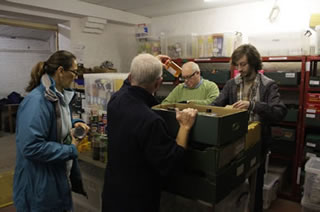'Only Three Pay Cheques Away From A Crisis'
A look at the vital work of Ealing Food Bank
|
The recent award winning Ken Loach film 'I, Daniel Blake' portrayed the stark reality of the benefits system. It also highlighted the growing importance of food banks.
In this special feature, Rory Thomas, visits Ealing's Food Bank to find out more about their work.
Janet Fletcher is an administrator for Ealing Food Bank where she has worked for two years at their offices in West Ealing, by Saint James Church.
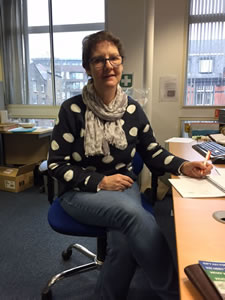
Prior to that she was a volunteer with a local night shelter. The food bank launched in October 2013, and recently celebrated its three-year anniversary.
Ealing Food Bank is a registered charity and part of the Trussell Trust network of food banks, currently with 420 sites across the UK. Each is run much in the same method and with much the same objective: to provide food and advice to those in crisis.
The Ealing initiative began with a group of local churches collaborating with the same vision, and where Janet was, at the time, involved with the Ealing Churches Winter Night Shelter. After some years and seeing a growing need in the borough, they started the charity. Volunteers are very important to the success of EFB, and as Janet remarked, '' It’s one thing to see a need, it’s another to know you can fulfil it.''
There were initially around forty to fifty churches interested in Ealing alone, and nine were recruited to get the charity off the ground. Today EFB have 150 active volunteers and joining the Trussell Trust gave the initiative the necessary structure and support network
Janet tells me it’s not just “here’s your food and off you go, it’s more than that”. The Food Bank offers both food and advice. As well as “food sufficient for three meals for three days”, visitors may also learn about drop-in centres, welfare advice, language courses and other various support groups. They also work with a Big Lottery Fund program called Help Through Crisis, which, depending upon personal circumstance, provide a 10-week program of support, advice and useful life skills in communication, building a CV and engaging effectively with society.
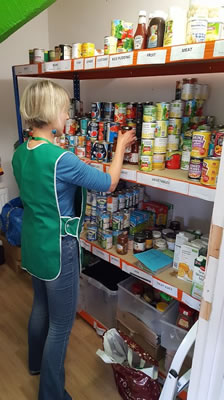
Janet says she sees ‘anyone and everyone’, at the food bank. According to criteria, a ‘food crisis’ is defined as ‘no food in the cupboards, no money to buy food’ (even if there is a coming pay cheque), and their top criteria is ‘low income’ peoples. That means people can still be earning, but should their salary be insufficient to afford anything more than, say, a place to live, they can still get food. Janet says “there are statistics to suggest we are all three pay cheques away from crisis” – a sobering thought. She goes on: “peoples living expenses have risen but their salaries haven’t, which is a scary thought”.
All food is donated, and comes from a variety of sources including schools, various businesses and churches, and collection points can be found at several superstores including Tesco, Sainsbury’s and Waitrose. Tesco also top-up a kilogram of food by 20% in cash and they will allow the charity to be a physical presence in store, on occasion.
Over the last two years they have had an average of 8 tonnes of food per six-week period, which does present storage issues but she tells me they request non-perishables (six-month minimum shelf life) to manage this for the short term.
Clients can visit up to six cafes around the borough, including Acton, Hanwell, Greenford, Northolt and Southall. The charity provide other amenities such as tea bags, toilet rolls and household items as well as toiletries, providing a decent basic quality of life for people.
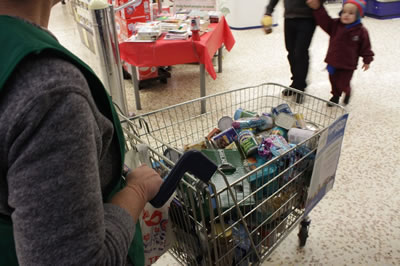
Janet says there has been a powerful response evident in generous donations following the release of I, Daniel Blake, but she fears this will taper off and ongoing awareness of the service is critical. The need has become more intense and Janet fears the change in universal credit will affect many more people in the future.
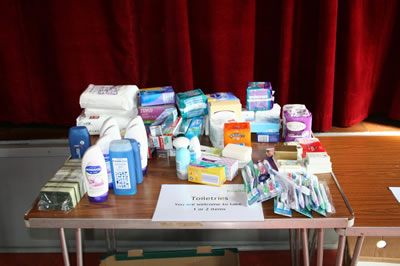
To close, Janet said, “The thing that was missing from the I, Daniel Blake film was people think you can just rock-up to a food bank and get what you need, but the references really crucial because they (the clients) genuinely need support. They are not “scroungers”. People still think people who use this service are wasters and they are not!
''They are people, like you or I, genuinely in need. We mustn’t judge anyone or their reason to come through our door.''
Rory Thomas
@rorythomasb
Find out how you can help Ealing Food Bank here
If you need help from Ealing Food Bank click here
22 December 2016
